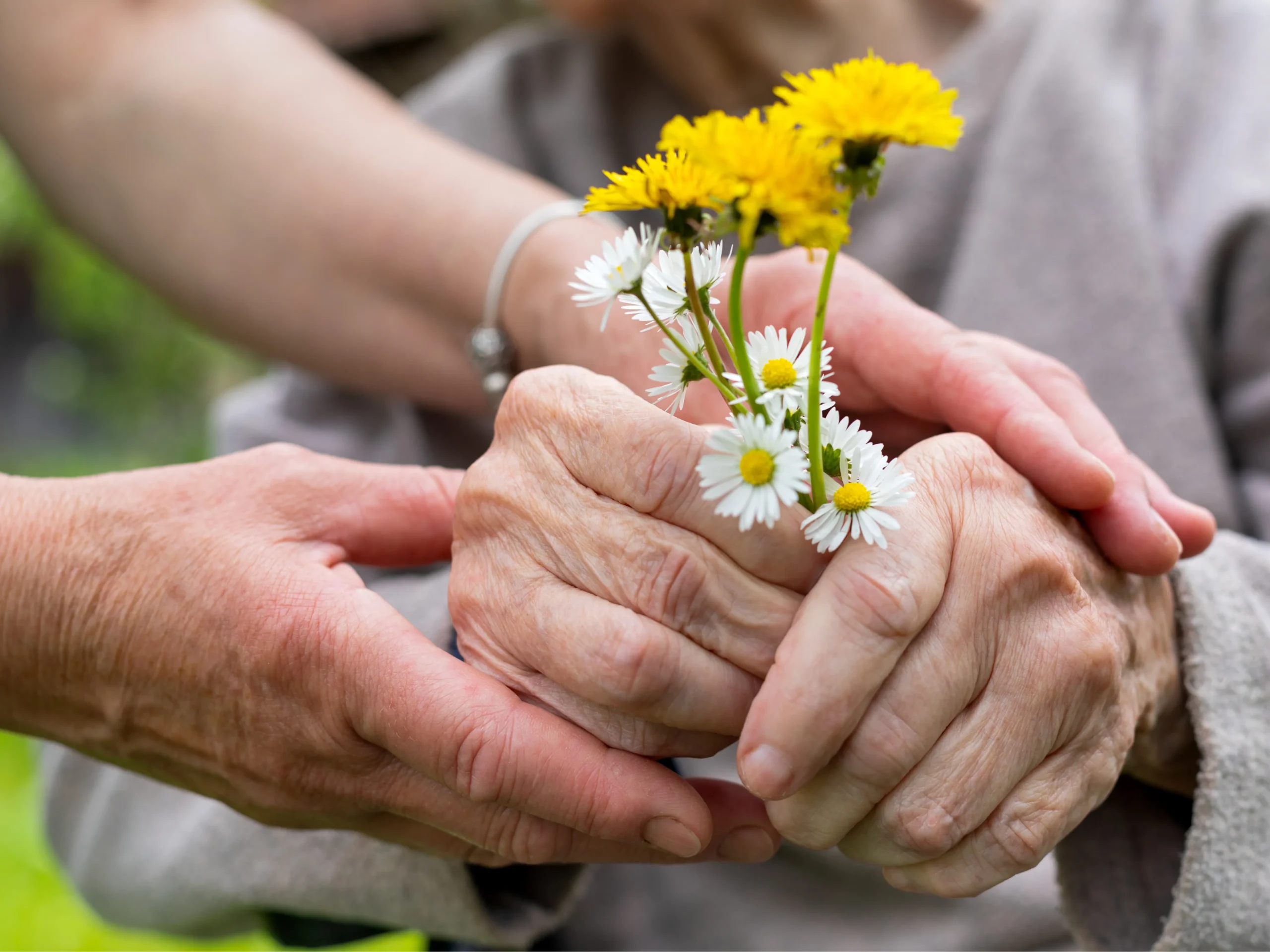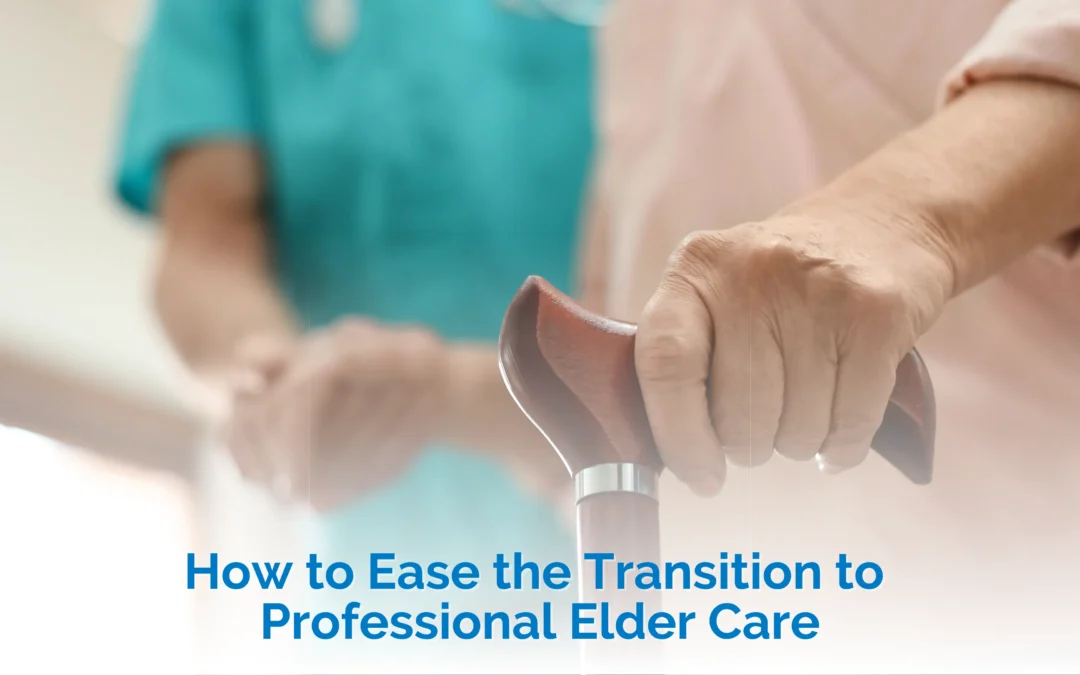While often difficult, seeking professional care is not simply walking away from elderly parents but rather a responsible decision to provide them with the best care and support
Sunny Days In-Home Care Carolinas understands these challenges and is committed to easing the journey by making a well-planned transition to professional elder care, which can improve health outcomes, reduce caregiver stress, and enhance seniors’ quality of life.
This article will delve into aspects of the transition, from recognizing the need for care to ongoing management and how our services can support you through this critical process.
Recognizing the Need for Professional Care
Recognizing the appropriate time to ask for professional help is a crucial first step. This decision to transition to professional elder care often comes after a period of family caregiving and requires careful observation and honest assessment.

Signs of Caregiver Burnout
Emotional exhaustion is a common indicator that it may be time to consider professional care. Family caregivers may feel trapped, overwhelmed, anxious, or depressed, struggling to manage the responsibilities of caregiving alongside their other responsibilities. This emotional burden can manifest in different forms, such as increased irritability, hopelessness, or detachment from loved ones.
Physical fatigue is another key sign. Constant tiredness and difficulty sleeping can lead to a weakened immune system or other chronic diseases, such as hypertension. This physical exhaustion can significantly affect one’s health, making it challenging to provide the level of care needed.
Caregiving can also impact personal relationships and job performance. Conflicts with other family members, withdrawal from social activities, or difficulty concentrating at work are major red flags a caregiver needs to watch out for. These can create a ripple effect, impacting not only personal life but also the ability to provide effective care.
Indicators Your Elderly Parent Needs More Help
A deterioration in physical health, such as unintentional weight loss, frequent falls, or increasing mobility issues, is a sign that your parent may need more assistance than you can provide alone.
You may notice your parent struggling with activities they once performed easily, such as getting dressed, preparing meals, or maintaining personal hygiene. These changes can occur gradually, so noticing subtle shifts in their physical abilities and overall health is essential
While some cognitive changes are normal parts of aging, significant declines may signal a need for additional support and supervision. Memory loss, confusion, and difficulty managing medications are warning signs your parents need help at home to ensure their safety and well-being.
Sudden shifts in temperament, such as uncharacteristic irritability or aggression, may signal underlying health concerns or frustration with diminishing capabilities. These emotional changes often result in social withdrawal, raising alarms as isolation can pave the way for depression. Moreover, disruptions in sleep cycles and daily habits can impact overall well-being.
Lastly, maintaining a safe living environment becomes challenging when physical and cognitive abilities decline. Cluttered homes, neglected home maintenance, and unsafe practices like leaving appliances on or doors unlocked can pose serious risks to your loved ones. Before it is too late, maybe it is time to start considering asking a professional to help your elderly parents stay in their beloved homes.
Preparing for the Transition to Professional Elder Care
Once you have recognized the need, the next crucial step is to prepare for the transition to professional elder care.

Having the Conversation
How to have tough conversations with aging parents is crucial. Find a quiet, comfortable place where you can talk without interruptions. The timing of the conversation should be when your loved one is relaxed and open to talking. Avoid mentioning the topic during stressful situations or when your parent is tired or in pain. Also, consider involving a trusted family member or friend who can provide support and help facilitate the discussion.
Next, approach this sensitive topic with empathy and understanding. Remember that transitioning to professional elderly care can be frightening for your parents, and they may initially resist the idea. Listen to their concerns, validate their feelings, and avoid being pushy or dismissive of their worries. Instead, focus on how professional care can enhance their quality of life and provide them with the support they need to maintain their independence as much as possible.
Address any fears or concerns your parent may have about the transition to professional elder care. Be prepared to provide information about how professional help can enhance their quality of life and maintain their independence as much as possible. Emphasize that professional care is not about taking away their autonomy but providing the support they need to live their best lives.
Involving Other Family Members
It is crucial to ensure that all family members are on the same page regarding the decision to transition to professional elder care. Hold a family meeting to discuss the situation and gather input from everyone involved. This meeting can be in person or via video call if family members are geographically dispersed. Promote an atmosphere of openness and honesty, where every family member can express their thoughts, concerns, and suggestions.
Do not be afraid to distribute roles and responsibilities to lighten the load on your shoulders. Some may be more suited to handling financial matters. In contrast, others might be better at providing emotional support or researching care options. When assigning tasks, consider each family member’s strengths, availability, and relationship with the elderly parent.
Researching Care Options
Identify the types of professional care available, such as in-home senior care, assisted living facilities, or nursing homes. Each option has its benefits and considerations. In-home care allows seniors to remain in familiar surroundings while receiving professional support. Assisted living facilities balance independence and care, while nursing homes provide more comprehensive medical care.
Take the time to research each option thoroughly. At the same time, consider your elderly parent’s specific needs, medical requirements, and personal preferences. This thorough assessment will help you narrow down the most suitable care options and ensure that your parent’s needs are addressed in the care plan.
When you have chosen the perfect care option, list potential care providers, research the services they provide, read the reviews, and consider getting a free consultation to get a better feel for each option. Also, do not hesitate to ask about the qualifications and training of their caregivers and their ability to adapt to changes in your parents’ care requirements.
Making the Transition to Professional Elder Care Smooth and Comfortable
To ensure a smooth and comfortable transition, it is vital to gradually personalize the care experience to help your loved one feel more at ease and supported throughout the process.

Personalizing the Care Experience
Work with the caregiver to maintain a sense of normalcy and continuity in your elderly parents’ daily lives. Try incorporating your parents’ hobbies, interests, and routines into their care plan. Activities to consider may include reading together, engaging in craft projects, playing games, and even doing safe and fun outdoor activities for the elderly, such as watching sports matches and sightseeing.
To make the transition to professional elder care as easy as possible, create a comfortable and familiar living space that reflects their tastes and contains cherished items. Consider following our home safety tips for elderly people to enhance safety and accessibility without drastically changing the feel of the home. Modifications may include adding grab bars in the bathroom, lowering light switches, or rearranging furniture to create clear pathways. The goal is to create a safe and comforting space for your parent
Lastly, discuss the importance of maintaining your parents’ dignity and independence with the caregiver. Ensure the caregiver respects and honors your parents’ preferences, cultural background, and personal boundaries. However, if your elderly parents’ decision-making processes become questionable, consult healthcare professionals to assess cognitive function.
Providing Emotional Support
It is completely normal for your elderly parents to experience a range of emotions, including anxiety, sadness, or frustration, during the transition period. Listen empathetically to create a safe space for your parent to express these feelings without judgment. Adjusting to this change may take time, but consistent support and understanding can help your parents feel more secure during this transition
The simplest thing you can do to help smooth the transition to professional elder care is to offer reassurance about the benefits of personal care and be present during this challenging time. Your continued involvement and support can significantly affect how well your parent adapts to the new care arrangement. Regularly visit or call to check on your parents’ well-being and show that you are still actively involved in their care.
If things get hard, remind your parents to seek meaning in their lives by maintaining social connections as family and friends, which can help them overcome the hurdle of aging and transition to professional elder care. Work with the caregiver to facilitate visits from friends and family members, consider organizing small gatherings or outings if your parent can participate, or help your parent set up and use technologies, like video calls or social media, to stay in touch with long-distance loved ones.
Monitoring and Adjusting the Care Plan
Schedule regular check-ins with the caregiver to assess progress and address concerns, as this helps maintain a high standard of care in the transition to professional elder care.

Regular Check-Ins
Schedule regular check-ins with the caregiver to assess progress and address concerns. These meetings provide valuable opportunities to discuss your parent’s well-being, any changes in their condition, and the effectiveness of the current care plan. Aim for a mix of formal reviews and informal conversations to get a comprehensive picture of the care situation.
Make necessary adjustments to the care plan as needed. As your parents’ conditions or circumstances change, be prepared to modify the care plan accordingly. This plan might involve increasing care hours, adding new services, or changing the care focus to address emerging needs.
Maintaining Open Communication
Keep lines of communication open between the family, caregiver, and care provider. Regular updates and discussions prevent misunderstandings and ensure everyone works towards the same goals. Consider using a shared communication tool or care journal to inform all parties of essential developments.
Suppose any issues or concerns arise during the care process. In this case, address those issues promptly and effectively. Encourage all parties to voice concerns as they arise and work collaboratively to find solutions. Quick problem resolution can prevent minor issues from becoming major obstacles.
Long-Term Evaluation and Adaptation
The key to a successful caregiving process is to be flexible and adaptable to changes in your parents’ condition or preferences. As time passes, your parent’s condition may change, requiring adjustments to their care. So, periodically re-evaluate your parents’ needs and the effectiveness of the care plan.
Also, stay informed about new caregiving options and resources. The field of elder care is constantly evolving, and new approaches or technologies may benefit your parent’s care. Attend workshops, read relevant information, or consult with professionals to stay up-to-date on the latest developments in senior care.
How Sunny Days In-Home Care Carolinas Can Help
Our Comprehensive Care Services
At Sunny Days In-Home Care Carolinas, we understand that the transition to professional elder care can be challenging. Our team is dedicated to making this process as smooth and stress-free as possible for seniors and their families. Moreover, we offer a comprehensive range of services to meet the unique needs of each client, from personal care and companionship to respite care and specialized care for conditions such as dementia or Alzheimer’s.
Our care plans are customized to meet individual needs and preferences as we work closely with families to understand their unique situations and develop tailored care solutions that align with the client’s lifestyle, routines, and personal preferences.
Getting Started with Sunny Days Carolinas
Beginning the transition to professional elder care with Sunny Days Carolinas is straightforward. We start with a consultation to understand your needs, followed by a comprehensive assessment and developing a personalized care plan. Our team will work with you and your family to ensure a smooth transition and ongoing support.
We encourage you to reach out for a free consultation. This no-obligation meeting can help you understand how our services can support your family during this critical transition. It is an opportunity to ask questions, discuss your needs, and explore how Sunny Days Carolinas can help ease the transition to professional elder care for your loved one.
End Note
While challenging, the transition to professional elder care can improve the quality of life for the elderly and their family caregivers. In-home care, in particular, offers numerous benefits. It allows seniors to receive professional support while remaining in the comfort of their own homes. It provides personalized care, maintains familiar surroundings, and offers flexible care arrangements.
Contact Sunny Days In-Home Care Carolinas to discuss your needs and explore the available caregiving options. Our team is here to support you through every step of the transition to professional elder care, ensuring that your loved one receives the compassionate, high-quality care they deserve.


